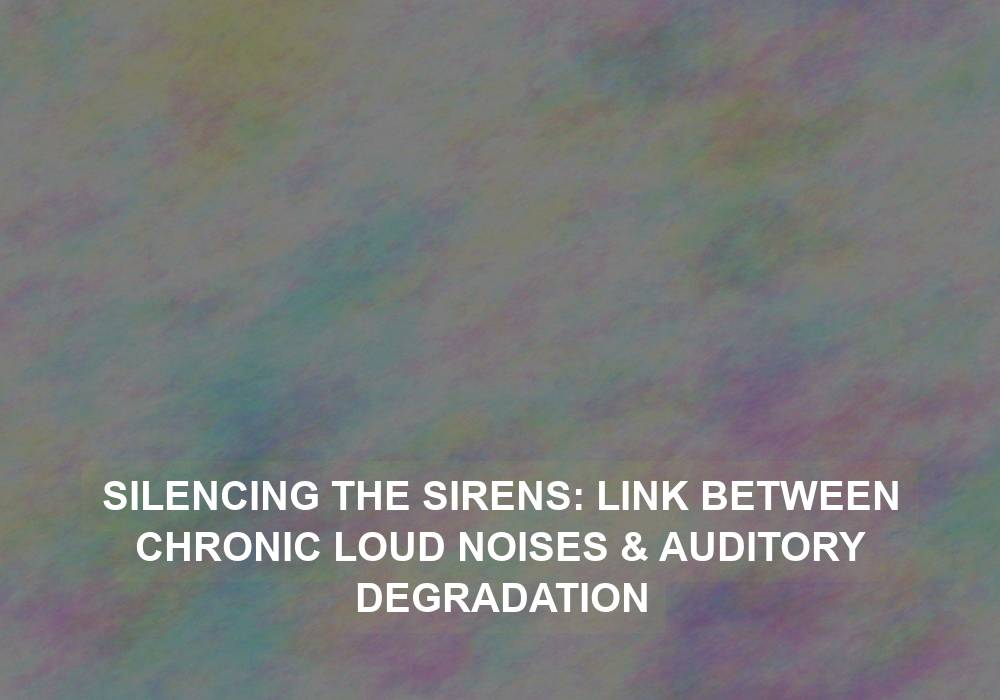Loud noises have become an integral part of our daily lives, from bustling city streets to booming construction sites and blaring sirens. While we may have grown accustomed to these sounds, it is important to understand the potential consequences they can have on our auditory health. This article delves into the link between chronic loud noises and auditory degradation, shedding light on the impact and ways to mitigate its effects.
Understanding Auditory Degradation
Before we delve into the link between chronic loud noises and auditory degradation, let’s first understand what auditory degradation entails. Auditory degradation refers to the gradual decline in a person’s ability to hear sounds clearly. It is often a result of various factors, including age, genetics, exposure to loud noises, and certain medical conditions. Chronic exposure to loud noises has been identified as a significant contributor to auditory degradation.
Auditory degradation can manifest in several ways. It can lead to a loss of sensitivity to certain frequencies or difficulty in understanding speech, especially in noisy environments. This decline in hearing acuity can be particularly noticeable in higher frequency ranges. The delicate structures within our ears, such as hair cells and nerve endings, play a crucial role in transmitting sound signals to our brain. When exposed to prolonged loud noises, these structures can suffer from overstimulation and physical trauma, resulting in irreversible damage.
Unveiling the Link
Extensive research has found a clear association between chronic exposure to loud noises and auditory degradation. When we are exposed to loud sounds, the delicate structures within our ears, such as hair cells and nerve endings, can become damaged. These structures play a crucial role in transmitting sound signals to our brain, allowing us to perceive and understand the sounds around us.
However, when subjected to prolonged loud noises, these structures can suffer from overstimulation and physical trauma. Over time, this can lead to irreversible damage, resulting in a decline in hearing acuity. The damage caused by chronic loud noises is often most prominent in the higher frequency ranges, making it difficult to perceive certain sounds or conversations.
It is important to note that while loud noises can have an immediate impact on our auditory health, the cumulative effect of chronic exposure is equally significant. The damage may not be immediately apparent, but it can slowly accumulate over time, leading to long-term auditory degradation.
Effects on Daily Life
The effects of auditory degradation can be profound and far-reaching, impacting various aspects of daily life. Individuals experiencing auditory degradation may struggle to follow conversations, especially in noisy environments. They may also have difficulty localizing sounds or differentiating between similar sounds. Moreover, auditory degradation can lead to feelings of isolation, frustration, and reduced overall quality of life.
In addition to communication challenges, auditory degradation can also affect one’s emotional well-being. Struggling to hear and understand others can lead to increased stress and anxiety. It may also limit participation in social activities, leading to a sense of isolation and decreased enjoyment of daily experiences.
Mitigating the Effects
While the link between chronic loud noises and auditory degradation may seem concerning, there are steps we can take to mitigate its effects. Here are some strategies to consider:
-
Noise Reduction: Minimizing exposure to loud noises is crucial in protecting our auditory health. This can be achieved by using earplugs or earmuffs in noisy environments, such as concerts, construction sites, or airports. Additionally, maintaining a peaceful and quiet living environment can help minimize daily exposure to loud sounds.
-
Volume Control: When using personal audio devices, such as headphones or earphones, it is important to keep the volume at a reasonable level. Listening to music or other audio content at excessively high volumes can lead to cumulative damage over time. Implementing volume control measures, such as setting volume limits or using noise-cancelling headphones, can significantly reduce the risk of auditory degradation.
-
Regular Breaks: If your work or daily routine involves exposure to loud noises, make a conscious effort to take regular breaks in quieter environments. Allowing your ears time to rest and recover from the continuous exposure to loud sounds can help prevent long-term damage. Taking short breaks during activities that involve loud noises, such as using power tools or attending concerts, can provide much-needed relief to your auditory system.
-
Seek Professional Help: If you suspect that you may be experiencing auditory degradation due to chronic loud noises, it is essential to seek professional help. An audiologist can assess your hearing and provide personalized recommendations to protect your auditory health. They may also suggest the use of hearing aids or other assistive devices to improve your overall hearing experience.
By implementing these strategies, we can effectively mitigate the effects of auditory degradation and protect our auditory health. It is crucial to prioritize our auditory well-being and take proactive steps to silence the sirens that threaten our ability to hear clearly.
Conclusion
The link between chronic loud noises and auditory degradation is undeniable. Prolonged exposure to loud sounds can result in irreversible damage to the delicate structures within our ears, leading to a decline in hearing acuity. However, by implementing noise reduction strategies, exercising volume control, taking regular breaks, and seeking professional help when needed, we can effectively mitigate the effects of auditory degradation. Let’s prioritize our auditory health and take proactive steps to silence the sirens that threaten our ability to hear clearly.
